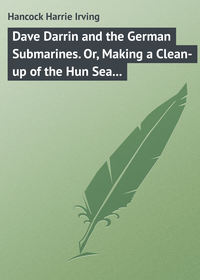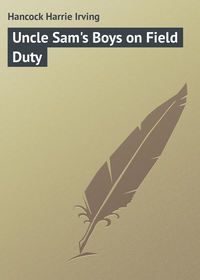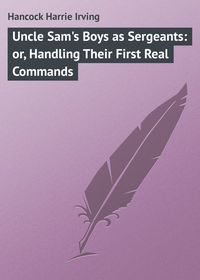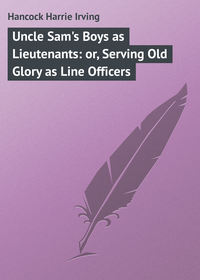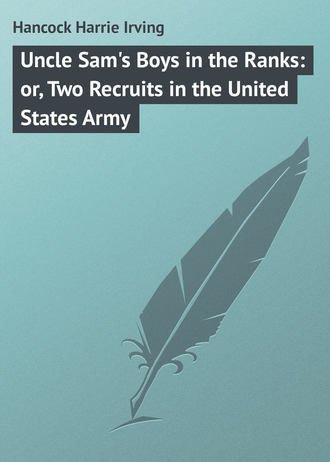 полная версия
полная версияUncle Sam's Boys in the Ranks: or, Two Recruits in the United States Army
Then the first faint signs of dawn came. Some of the soldiers were seated on the ground, gaping and with difficulty refraining from going to sleep, for these men of Uncle Sam's Army had been routed from their beds in the middle of the night.
The morning light increased, though it was still dim, and the first vague shapes near the ledge began to take more definite shape.
"We won't need to wait more than five minutes more, Sergeant Hupner," declared the captain.
Cortland stood holding his watch close to his face. As soon as he could read the time he turned to whisper:
"Now, Overton, lead us up to the exact spot from which you had your interview with the fellow Branders."
"Shall the men load, sir?" whispered Sergeant Hupner.
"Yes; full magazines."
As silently as possible the men of the little searching party slipped back the bolts of their pieces and loaded.
"Go ahead, Overton," whispered Captain Cortland.
Just behind Soldier Hal stepped the company commander himself, watching every footstep in order not to step on any loose stone that might sound a premature alarm.
Yet one man among them slipped and made a noise. It was trifling, but almost instantly a whistle sounded ahead.
Without even thinking to wait for orders Hal returned the whistle.
"That you, Tip?" called the voice of an invisible man. "Good for you, lad. We thought you was a goner."
Hal did not answer further, for Captain Cortland broke in:
"Rush 'em, men! We've got 'em."
"Ho! The blazes you have!" sounded a rough voice ahead. "Come on, boys – it's the sojers! Give it to 'em!"
Almost in an instant the crevices between the rocks ahead were full of red flashes.
Bullets sped, struck rocks with spiteful thuds and flattened out before bounding into the air again.
"Lie down, men!" shouted Captain Cortland. "Give it to the rascals as long as they shoot at us."
All in a moment this rock-strewn spot had become a bedlam of discharging firearms.
Two regulars were hit before they could find cover from which to fire. These men, however, made no outcry, but, finding themselves unable to handle their rifles, lay quietly where they had fallen until the time came for them to have attention.
Though he had sharply ordered his men to lie down, Captain Cortland did nothing of the sort himself. Instead, with his revolver drawn, he stood up, peering ahead and trying to get sight of the scoundrels beyond.
Bullets flew all about the captain, many of them passing his head. But he stood there calmly until he caught just the opportunity for which he had waited.
Then his pistol spoke, and a groan beyond showed that he had been a successful marksman.
"Squad, rise!" shot out the commander's order. "Charge!"
Crouching low, the soldiers sprang suddenly forward.
"Halt! Lie down," continued Cortland. He had gained sixty feet by his rush without loss of a man. "Fire only when you see something to shoot at. Commence firing at will."
Now the firing slackened, though it was not less deadly. Even the scoundrels ahead slowed down their fire, as though they found their weapons becoming hot.
Captain Cortland was in no hurry. He meant to have the scoundrels, dead or alive, but he did not intend to risk his own men needlessly. The army officer knew it was now only a question of time. Nor did he fear running out of ammunition, for the greater part of his small command was not yet in action, but posted beyond.
The daylight grew stronger; then the upper rim of the sun peeped over the horizon, sending its rays into the sky.
"Cease firing," commanded Cortland at last. Then he called over the rocks.
"Are you fellows ready to surrender to United States forces?"
"Not until we're all dead," came the taunting reply.
"Then we'll try to accommodate you by killing you with as little delay as possible," called back the captain. Then, to his own little force he added:
"Men, advance as you see opportunity. Fire whenever you see anything to aim at."
Steadily the regulars crawled forward, a foot or a yard at a time.
As they moved they tried, Indian fashion, to find new cover behind rocks over which they could aim and fire.
Hal and Noll, not ten feet apart, occasionally glanced at each other after firing.
Both young rookies were thoroughly enjoying this actual taste of fighting life.
It was not many minutes before the advancing handful of soldiers were within seventy or eighty feet of the rocks that sheltered the rascals.
Then suddenly they saw three crouching figures begin to retreat among the rocks.
With a cheer the attacking force went forward, crouching.
But just then three rifles from out beyond spoke, and bullets whistled past the scoundrels from a new quarter.
"Great smoke, boys!" bellowed one of the fugitives hoarsely. "The sojers have us hemmed in on all sides."
"Yes, we have," shouted Captain Cortland. "Do you want to surrender?"
"Make your men stop shooting or moving, and give us two minutes to think."
"We'll keep on advancing and firing until we have your surrender," retorted Captain Cortland grimly. "Whenever you want to surrender tell me so and raise your hands high in the air."
"Wait a min – "
"Keep on firing, men," called Captain Cortland.
"Hold on! We give in, Cap."
"Cease firing, men," called the commander of B Company. "Now you fellows jump up and show yourselves with your hands reaching for the sky."
Three rough-looking figures clambered up on rocks, holding their empty hands as high as they could get them. One of them had his neck bound, and there was blood on his clothing. This was the first man whom Hal had wounded back of Captain Ruggles's quarters at the beginning of the fray.
"Stand just that way until we reach you," ordered the army officer. "Close in on them, men, and fire if you see one of them reach for a weapon."
But the trio plainly had no further intentions in the way of fighting. They waited, sullen-faced and silent, until the soldiers had reached them and had taken away their weapons.
"You have handcuffs, Sergeant?" inquired the captain.
Hupner and Corporal Cotter both produced the steel bracelets. The three rogues were swiftly handcuffed.
"You'll find our boss over yonder," nodded one of the men. "He's bad hit, too."
They found the fellow, nearly unconscious, but groaning, his right shoulder badly shattered by the bullet from Captain Cortland's revolver.
"Sergeant," directed B Company's commander, "send a messenger back to the post for hospital men and an ambulance. You can report that two of our own men have been hit."
The leader of the scoundrels was lifted and carried back where the two men of B Company lay. Captain Cortland directed such aid as could be given on the spot to all of the wounded men.
"Shall I call in the men I posted, sir?" inquired Hupner.
"Not yet, Sergeant. There may be others of this gang hidden somewhere among the rocks. But you may take three men and search for others."
Within ten minutes the search had been made thoroughly. No more of the evil band had been found.
"We'll go back just as soon as the ambulance arrives and the wounded have been taken care of," announced Captain Cortland.
Hal, at that moment, had his eye on one of the prisoners. He saw a gleam of satisfaction show in the fellow's eyes.
"May I speak, sir?" asked Private Overton, saluting Captain Cortland.
"Yes," nodded the officer.
"May some of us remain behind them, sir, to search all this ground over?"
"For what, Overton?"
"It doesn't seem likely, sir, that these scoundrels have been living in the open air. And they must have some place for concealing their booty."
"Quite right, Overton. Corporal Cotter, take Overton, Terry and two other men and make a thorough search of the rocks and ground hereabouts."
Hal turned swiftly to the man in whose eyes he had seen that gleam of satisfaction the moment before. Now the fellow was scowling.
"That was a hit," Hal murmured to himself. "The rascals have some hiding place around here."
"Now we'll divide the ground up in small squares," announced Corporal Cotter as he led his picked men away. "We'll search each square minutely, so that no little patch may be overlooked."
"Won't it be best, Corporal," hinted Hal, "to start where the thieves were when the fighting began?"
"Just the ticket, Overton," nodded the corporal.
So the search began at that point. Nor did it last long, for Hal, thrusting with the butt of his rifle, poked a large bush partly aside exclaiming:
"I guess you'd better come here, Corporal," the recruit called.
As Cotter came running to the spot Private Overton displayed a hole rising some three feet above the grounds. It had been covered by the foliage of the bush.
"Looks like the mouth of a cave, doesn't it?" Hal asked, with gleaming eyes.
"A whole lot," agreed Corporal Cotter, producing a pocket electric flashlight. "You can follow me in, Overton, if you like."
Corporal and private crawled into the hole. They did not have to go more than six feet before they stood in a stone-walled chamber of considerable size. Roughly, it appeared to be an apartment of about twenty by thirty-five feet.
"Beds, tables, chairs, lamps, grub," enumerated Corporal Cotter, looking about him gleefully. "Take the lamp, Overton. I'm going back to call the captain."
Less than two minutes later Captain Cortland stood in the rockbound chamber.
"Well, this is a place!" whistled the officer in surprise.
"This chest is locked, sir," reported Hal, who had been improving his time by looking about. "Do you think it may contain loot. Captain?"
"There's an ax," nodded Cortland, glancing around him. "Corporal, just try the ax on the chest – carefully."
With a few blows Cotter had the chest open. Captain Cortland knelt by the wooden chest to inspect.
"This is clothing on top," he announced. "But – ah, what does this look like?"
In the middle of the chest's contents he had come upon carefully wrapped packages of jewelry, watches and the like.
"We won't go any further just now," declared the captain. "But we'll take back this chest with us."
On the return to Fort Clowdry the prisoners, though captured on the military reservation, were turned over to the civil officers. Even Tip Branders and the wounded chief of the band were taken to Clowdry for care by the town authorities.
The chest was found to have contained all the stolen jewelry. The money that had been taken on the same raids, however, was not found. Plainly the thieves had used the money for the needs of the moment.
Hal and Noll, on their return, reported promptly to the commander of the guard, for they still belonged to the guard detail.
"Queer, ain't it?" asked Private Bill Hooper that morning in Hupner's squad room as the men were washing up before morning mess call.
"What is?" demanded Private Hyman.
"Why, that kid, Overton, knew one of the gang – one, at least – all the time. Yet Overton shot his old-time friend. And Overton knew all along where the bunch was hiding. And did you hear how neatly he led Corporal Cotter right to the cave of the gang? Now if that don't prove – "
Hyman promptly knocked Hooper down.
"It proves, Bill," growled Hyman, "that you're so fond of lying that you don't know the truth when you hear it."
CHAPTER XXIV
CONCLUSION
TIP BRANDERS recovered.
So did the leader of the gang with which Tip had foolishly cast his evil lot down in Pueblo, when he had first come west after robbing his mother. The man wounded in the neck had been at no time in a dangerous condition.
Not much sympathy need be wasted on Tip. He had chosen his own place in life, and had filled it.
Before Tip was out of the local hospital, and in his cell in jail, his mother, who had read of his fate in a newspaper in her home town, joined her son in the town of Clowdry.
She stood by her son to the last, until the testimony of officers and soldiers from Fort Clowdry had sent him away to prison for ten years.
At first, on his recovery, Tip Branders had been inclined to be boastful. He had shown his boldness by his thieving exploits and by daring to face the steady rifle fire of Private Hal Overton, United States Army. But when the sentence of the court came upon him Tip broke down. He wept and could hardly stand. He implored the judge to lessen his sentence. All the braggadocio in him ran out as rapidly as the sawdust from a punctured doll.
The other members of the band received equally severe sentences, for all had been engaged in battle with troops who represent law and order.
From that trial Hal and Noll journeyed to Denver. Major Davis, of the Seventeenth Cavalry, also traveled from his post, for the trial of the baffled men who had attempted to rob the United States mail was on in the United States District Court. These men, too, were sent away to the penitentiary for long terms.
The writer of the anonymous note against Hal had so far escaped detection.
"We've been getting a lot of travel lately," smiled Hal as the two chums trudged down the road from the railway station to Fort Clowdry on their return from Denver.
"All we're going to have for a while, I hope," returned Noll Terry quietly. "I'd sooner put in my time learning soldiering."
"Not tired of the army yet, Noll?"
"I never shall be, nor you either, Hal, as long as we're young enough to serve."
"What I dread," mused Hal, "is the time when if we live to that age, we shall be too old for the Army, and will have to go away and settle down in some town as retired men of the Army."
"That will be time to die, won't it?" asked Noll, so solemnly that Private Overton laughed merrily.
"That time is a long way off, Noll Terry. Let's see; we're eighteen now, and a fellow doesn't have to be retired, for age, until he's sixty-two."
"Forty-four years," figured Noll. "Oh, well, a fellow ought to be able to have a deal of fun in that number of years."
Both recruits were in merry mood as they turned in past the sentry at the main entrance to the post grounds.
They kept on, full of life and spirits until they reached the edge of the parade ground.
"Attention!" murmured Hal quietly.
Unostentatiously but with a world of reverence in their act both young soldiers lifted their uniform caps close to the shadow of the grand old Flag.
Without halting they passed on, returning their caps to their heads. Both young men of the service walked a trifle more erectly, if that were possible.
Nor had they gone much further when they espied a man coming toward them. The broad white stripes down the seam of his trousers, and the double-barred shoulder straps proclaimed the infantry officer. It was Captain Cortland, commanding officer of B Company.
Both young soldiers raised their right hands smartly in salute as they passed the officer, who returned their salute in kind. Then Cortland halted.
"Glad to see you back, Overton."
"Thank you, sir."
"And you, too, Terry."
"Thank you, sir."
"And, by the way, Terry, I have remembered your request that you be transferred to B Company, and to Sergeant Hupner's squad room. Captain Freeman said he was sorry to lose you, Terry; but since you wanted to be with your friend, he has consented to your transfer to B Company. The matter has been arranged through the adjutant, and my first sergeant will notify you of your transfer when you return to your former squad room. I'm very glad, Terry, to have so good a soldier as yourself in B Company, even if I do have to rob Captain Freeman."
"Thank you, sir," replied Noll, with another salute.
Then the two young soldiers resumed their walk. Just as soon as they were out of earshot of Captain Cortland, Noll broke forth jubilantly:
"In the same company at last, Hal, old fellow. Oh, won't it be great, now that we're truly bunkies at last!"
Great indeed – greater than either Hal Overton or Noll Terry guessed. They stood at the beginning, though neither suspected it, of some exciting and never-to-be-forgotten incidents and phases of the soldier's life.
What followed, however, will have to be reserved for the next volume in this series, which will be published under the title: "Uncle Sam's Boys on Field Duty; Or, Winning Corporal's Chevrons." In this volume the two young soldiers will be found to be no longer recruits, but trained soldiers of the Regular Army, and in the midst of a series of rousing adventures incidental to the military life.
The End

